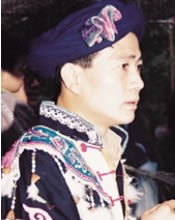Bunuo in China

Photo Source:
Copyrighted © 2026
Operation China, Asia Harvest All rights reserved. Used with permission |
Send Joshua Project a map of this people group.
|
| People Name: | Bunuo |
| Country: | China |
| 10/40 Window: | Yes |
| Population: | 22,000 |
| World Population: | 22,000 |
| Primary Language: | Bunu, Bu-Nao |
| Primary Religion: | Ethnic Religions |
| Christian Adherents: | 0.00 % |
| Evangelicals: | 0.00 % |
| Scripture: | Portions |
| Ministry Resources: | No |
| Jesus Film: | Yes |
| Audio Recordings: | Yes |
| People Cluster: | Yao-Mien |
| Affinity Bloc: | Southeast Asian Peoples |
| Progress Level: |
|
Introduction / History
Most scholars suggest that the Miao, She, and Yao (including the Bunuo) minority groups today are probably from the same original ethnic group. As these peoples split geographically and separated into distinct entities, many of them suffered terrible harassment and persecution from the Chinese and other peoples. Those groups considered particularly violent and rebellious were treated the worst. The 1725 Guizhou Tongzhi, a book on the different subgroups of Miao, mentions a group called the Hei Sheng Miao. They were described as "a treacherous and aggressive people". One Miao album assures us that "about half of them were killed and the rest surrendered", while another album reassures the reader that "in 1736 they were conquered once and for all".
The Bunuo qualify as a distinct ethno-linguistic people group, but their claims have been ignored by the Chinese authorities who have placed them in the Bunu group, which in turn is officially considered part of the Yao nationality. The Chinese call the Bunuo as Beilou Yao, which means "basket-carrying Yao". This is also the nickname given to the Dongnu people, but the Dongnu and Bunuo speak separate languages. For centuries the Chinese preferred to ignore the Bunuo; they considered the Bunuo to be ignorant barbarians living in the remote mountains. Not willing to study the ethno-linguistic composition of the Bunuo until recently, the Han gave nicknames like "Beilou Yao" to them in reference to visible attributes they saw on the Bunuo's infrequent trips down from their isolated mountain hideouts.
What Are Their Lives Like?
The Bunuo have also faced great hostility down through the centuries. This has resulted in them being a very secluded people who distrust outsiders to this day.
What Are Their Beliefs?
The religious beliefs of the Bunuo include many different rituals borrowed from Daoism and Buddhism. It is not known if the Bunuo worship Pan Hu, as do many other Bunu and Yao groups in Guangxi.
The Bunuo are a practically untouched people group, separated from the Gospel by geographical, political, cultural, and linguistic barriers. Because they are not officially recognized by the Chinese government, the Bunuo are unknown to both Chinese and Western Christians. There are very few believers of any kind in the part of Guangxi inhabited by the Bunuo.
What Are Their Needs?
The Bunuo people need to submit to Jesus Christ so they can experience the abundant life he offers them in John 10:10.
Prayer Points
Pray for bold workers who are driven by the love of the Holy Spirit to go to them.
Pray for an unstoppable movement to Christ among them.
Pray for the authority of Christ to bind hindering spiritual forces to lead them from darkness to light.
Pray for signs and wonders to happen among them and for great breakthroughs with a rapid multiplication of disciples and house churches.